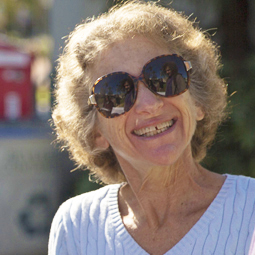Eve Kornfeld

Professor
Office: AL 571
Email: [email protected]
Education
Ph.D. in History, Harvard University (1983)
M.A. in History, Harvard University (1979)
B.A. in History, Princeton University (1977)
Eve Kornfeld, Senate Distinguished Professor and Professor of History, earned her B.A. at Princeton University and her M.A. and Ph.D. in History at Harvard University. She has taught in Harvard’s History and Literature concentration, Princeton’s History and European Cultural Studies departments, and SDSU’s History, MALAS, Honors, and Arts Alive Collaborative programs. Her teaching and scholarship are interdisciplinary, transnational, polyphonic, and informed by post-colonial, post-structural, gender and critical race theories. Her books were published in the Bedford Series in History and Culture of St. Martin’s Press, and her articles have appeared in the William and Mary Quarterly, Journal of the Early Republic, Journal of American Studies, Canadian Review of American Studies, New England Journal of History, Pennsylvania History, The History Teacher, and the Journal of American Culture. She served on the governing board of the American Culture Association. She received the College of Arts and Letters Excellence in Teaching Award in the Humanities and Social Sciences in 2017, the SDSU Senate Excellence in Teaching Award in 2018, and the College of Arts and Letters Exceptional Service Award in 2021.
As a first-generation college graduate, Dr. Kornfeld’s mission as a college professor is to open doors for her students and to encourage them to walk through those doors with confidence and joy. Mentoring first-generation students through their undergraduate lives and learning, first experiences with research and conference presentations, applications to graduate or professional programs, and expanding career choices and decisions is her continuing passion. She is especially proud of her many Student Research Symposium participants and winners, and of the extensive mentor network through which her past and current graduate and undergraduate students assist each other to find new graduate school and professional opportunities.
Books
Creating an American Culture, 1775-1815 (Bedford Series in History and Culture, St. Martin’s Press, 2001).
Margaret Fuller (Bedford Series in History and Culture, St. Martin’s Press, 1997).
Edited Volume
America’s Polyphonic Past (Pearson Learning Solutions, 2004, 2007, 2013).
Journal Articles
“History and the Mental Health Crisis: Preparing University Students to Live with Uncertainty through Authentic Research and Metacognition,” The History Teacher 53:3 (2020), 561- 585.
“Failing to Teach, Disrupted Lessons, and Resistance in the ‘History for Teachers’ Classroom,” The History Teacher 53:4 (2020), 635-674.
“Encountering ‘the Other’: American Intellectuals and Indians in the 1790s,” William and Mary Quarterly, 3rd ser., 52:2 (1995).
“Journals and Discussions in Large Classes,” Journal for Learning Enhancement 1:1 (1996). “History and the Humanities: The Politics of Objectivity and the Promise of Subjectivity,” in Teaching the Humanities, American Council of Learned Societies Occasional Papers #23 (New York, 1994).
“Representations of History: Role-Playing Debates in College History Courses,” Perspectives of the American Historical Association 28:6 (1990). Reprinted in History Anew: Innovations in the Teaching of History Today, ed. Robert Blackey (Long Beach: University Press, 1993).
“Out of Order: The Challenge of Outsider Jurisprudence and Eudora Welty's (Extra)Legal Vision to the American Rule of Law,” Canadian Review of American Studies, special issue (1993).
“Tracing the Spectrum of American Culture: Model Approaches, Methods and Studies,” An American Culture Association “Dream Conference” ed. Fred E.H. Schroeder (Bowling Green: Popular Culture Press, 1993).
“Reconstructing American Law: The Politics of Narrative and Eudora Welty's Empathic Vision,” Journal of American Studies 26:1 (1992).
“The Power of Empathy: A Feminist, Multicultural Approach to Historical Pedagogy,” The History Teacher 26:1 (1992).
“Gender and the Politics of Teaching History,” Organization of American Historians’ Newsletter, 20:4 (November 1992).
“Margaret Fuller: Minerva and the Muse,” (coauthored), Journal of American Culture 13:3 (1990).
“Culture and Counterculture in Post-Revolutionary America,” Journal of American Culture 12:4 (1989).
“‘Republican Machines’ or Pestalozzian Bildung? Two Visions of Moral Education in the Early Republic,” Canadian Review of American Studies 20:2 (1989).
“From Republicanism to Liberalism: The Intellectual Journey of David Ramsay,” Journal of the Early Republic 9:3 (1989).
“Crisis in the Capital: The Cultural Significance of Philadelphia's Great Yellow Fever Epidemic,” Pennsylvania History 51:3 (1984).
“Women in Post-Revolutionary American Culture: Susanna Haswell Rowson’s American Career,
1793-1824,” Journal of American Culture 6:4 (1983).
Book Chapters
“Beyond Good and Evil: Nietzschean Pedagogy in the History Classroom,” Nietzsche and Critical Social Theory (Brill, 2019), 499-513.
“‘I Don’t Think a Belacani Would Know How to Do It Right:’ Cultural Appropriation in Tony Hillerman’s The Ghostway,” Pop Culture Matters: Proceedings of the 39th Annual Conference of the Northeast Popular Culture Association, Martin F. Norden and Robert E. Weir, eds. (Newcastle: Cambridge Scholars, 2019), 26-35.
“Margaret Fuller,” Encyclopedia of Women in World History, ed. Bonnie G. Smith (Oxford University Press, 2007).
“Rose Terry Cooke,” American National Biography, ed. John A. Garraty and Mark C. Carnes, 24vols. (Oxford University Press, 1999), 5:405-407.
“The Female Bildungsroman in Nineteenth-Century America: Parameters of a Vision,” (coauthored), Journal of American Culture 10:4 (1987). Reprinted in Such a Simple Little Tale: Critical Responses to L.M. Montgomery's Anne of Green Gables, ed. Mavis Reimer (Metuchen: Scarecrow Press, 1992) and Children’s Literature Review 52 (1998).
“Maria Montessori,” Great Lives from History: Twentieth Century, ed. Frank N. Megill (Salem Press, 1990).